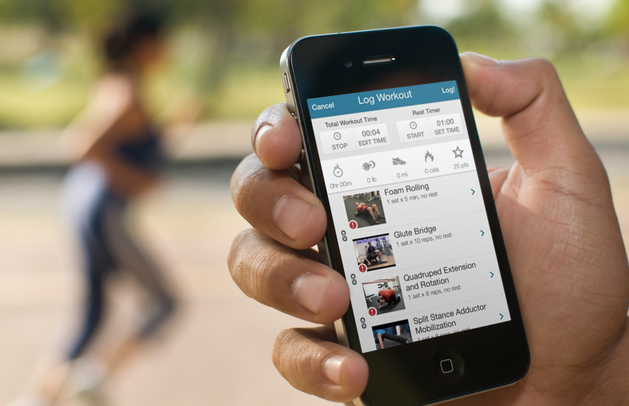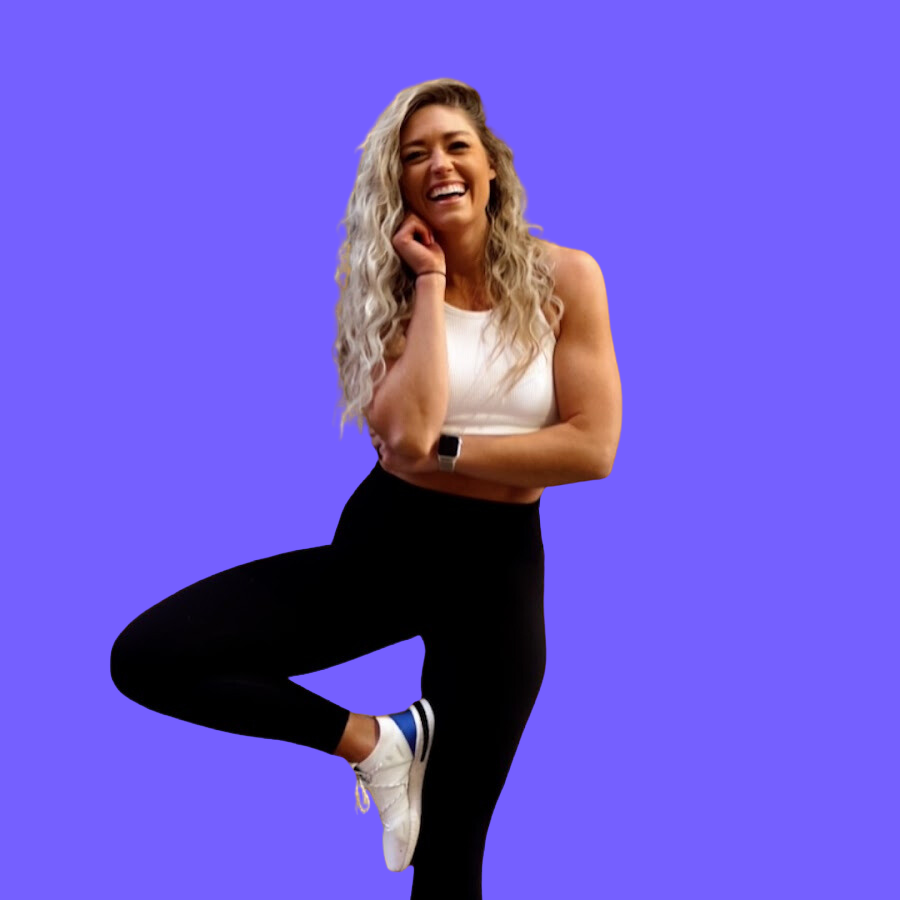What makes a fitness app successful?
A successful fitness app offers a seamless user experience, effective workout plans, performance tracking, and engaging interactive features. By using Exercise.com, you can create a custom-branded fitness app that incorporates all these success-driving elements.

Want to create your own custom branded fitness app? Get a demo now!
Whether you’re a fitness enthusiast or a fitness professional wanting to create your own fitness app, there’s no denying the importance of having a reliable and effective app to help guide you and your fitness community on your journey. A good fitness app can provide personalized workout plans, track your progress, and even offer community support along the way. But with so many types of fitness app options available in the market, what sets apart a successful fitness app from the rest? In this article, we’ll explore the key factors that determine fitness app success and what you should be looking for when choosing one to help you reach your fitness and fitness business goals.
Read More:
- How to Make a Yoga App
- Custom Branded Fitness Apps
- Best Fitness Mobile App Creation Software
- Best Fitness Influencer Apps
- Best White Label Fitness App
- What is the biggest fitness app?
- Fitness App Name Ideas
Understanding the fitness app market
Before delving into the key features of a successful fitness app, let’s briefly explore the market landscape. The global fitness app market has witnessed significant growth in recent years, with an estimated worth of over $4 billion in 2020. This can be attributed to the rising health consciousness among consumers and the growing popularity of smartphones and wearable devices. The market is highly competitive with major players like FitBit, Nike, and MyFitnessPal dominating the industry, but there’s still plenty of room for new entrants.
Market size and growth
The fitness app market is projected to continue growing, with a compound annual growth rate of over 20% between 2021 and 2026. This growth can be attributed to increased adoption of fitness tracking technology, growing health awareness, and rising demand for personalized workout plans and customized fitness routines.
Key players in the industry
When it comes to fitness app success, it’s important to understand the major players in the industry and what they offer. FitBit, for example, is known for its advanced tracking capabilities and integration with wearable devices, while Nike offers personalized training plans from professional athletes. MyFitnessPal is a popular option for food tracking and calorie counting, while Peloton provides a unique at-home workout experience with its live and on-demand fitness content.
Target audience demographics
Successful fitness apps tend to have a specific target audience in mind, whether it be casual gym-goers, elite athletes, or those simply looking to improve their overall health. It’s important to choose an app that aligns with your fitness goals and caters to your personal preferences and needs.
Read More:
- Best Fitness App Development Companies
- Fitness App Statistics
- Best Personal Trainer App Builder Software
- Best Personal Trainer Client Tracking Apps
Essential features of a successful fitness app
Now that we have a better understanding of the fitness app market, let’s explore the essential features that make for a successful app.
Personalized workout plans
A successful fitness app should provide a tailored approach to workout planning and scheduling, taking into account your fitness level and personal preferences. Look for an app that offers a variety of workout options, from strength training to cardio, and allow you to customize the duration, intensity, and frequency of your workouts.
Personalization is key when it comes to developing a successful fitness routine. Everyone has different fitness goals, schedules, and preferences, and a one-size-fits-all approach simply won’t cut it. A good fitness app should take into account your personal goals, fitness level, and schedule to create a workout plan that is tailored to your needs. Whether you’re looking to build muscle, lose weight, or simply stay active, a personalized workout plan can help you achieve your goals more effectively.
Goal setting and tracking
Setting and tracking fitness goals are key to maintaining motivation and measuring progress. An effective fitness app should provide a user-friendly interface for goal setting, allow you to track your progress over time, and offer tools to help hold you accountable, such as reminders and push notifications.
Goal setting is an important aspect of any successful fitness routine. By setting clear, measurable goals, you can stay motivated and track your progress over time. A good fitness app should allow you to set goals that are specific, measurable, achievable, relevant, and time-bound (SMART). This means setting goals that are realistic and achievable within a certain timeframe, such as losing 10 pounds in 3 months or running a 5K in 6 weeks. By tracking your progress towards these goals, you can stay motivated and make adjustments to your workout plan as needed.
Integration with wearable devices
Wearable devices like smartwatches and fitness trackers can greatly enhance your fitness tracking capabilities. When looking for a fitness app, consider whether it integrates with your wearable device and if it leverages the data collected to provide more accurate and personalized insights.
Wearable devices have revolutionized the way we track our fitness progress. By collecting data on our heart rate, steps taken, and calories burned, these devices provide valuable insights into our overall health and fitness. A good fitness app should integrate with your wearable device to provide more accurate and personalized insights into your fitness progress. This can help you make more informed decisions about your workout routine and track your progress more effectively over time.
Social engagement and community support
Working towards your fitness goals can be challenging, but having the support of a community can help keep you motivated and accountable. Look for an app that offers social engagement features, such as group challenges, friend invitations, and user forums.
Community support is a powerful motivator when it comes to achieving your fitness goals. By connecting with others who share your goals and challenges, you can stay motivated and accountable. A good fitness app should offer social engagement features, such as group challenges, friend invitations, and user forums, to help you connect with others and stay motivated.
Gamification and rewards
The use of gamification—turning fitness tracking into a game—can provide an added incentive for staying active and reaching your fitness goals. A successful fitness app should incorporate elements of gamification, such as badges, rewards, and challenges, to keep you engaged and motivated.
Gamification is a powerful tool for motivating people to stay active and reach their fitness goals. By turning fitness tracking into a game, a good fitness app can make exercise more fun and engaging. This can help you stay motivated and committed to your fitness routine over time. Look for an app that incorporates elements of gamification, such as badges, rewards, and challenges, to keep you engaged and motivated.
User experience and design
The user experience and design of a fitness app can greatly impact its success. A well-designed fitness app can help users achieve their fitness goals while providing an enjoyable and engaging experience. Here are a few key factors to consider when evaluating the user experience:
Intuitive navigation and interface
An effective fitness app should be easy to navigate and use, with a clean and intuitive interface. A cluttered and confusing interface can be frustrating and may discourage users from using the app regularly. Look for an app that provides clear instructions and guidance to help facilitate your workout routines and tracking. The app should be designed to make it easy to find the features you need, without having to search through multiple menus or screens.
For example, a fitness app might have a home screen that displays your progress toward your fitness goals, along with quick links to your workout routines and tracking tools. The app might also have a menu that allows you to easily switch between different types of workouts, such as strength training, cardio, or yoga.
Customizable appearance and settings
Everyone has their own preferences when it comes to app appearance and settings. Choose an app that allows you to customize the appearance, font size, and other display settings to your liking. This can help make the app more enjoyable to use and can also make it easier to read and navigate.
For example, a fitness app might allow you to choose from a variety of color schemes, or to adjust the font size and style to make it easier to read. You might also be able to customize the types of notifications you receive from the app, or to set reminders for your workout routines.
Accessibility and inclusivity
Fitness is for everyone, regardless of age, ability, or background. A successful fitness app should be accessible and inclusive, with features and resources designed for a diverse audience. Consider whether the app offers adaptive workouts, wheelchair-friendly exercises, or options for users with visual or hearing impairments.
For example, a fitness app might provide audio instructions for users with visual impairments, or offer sign language videos for users with hearing impairments. The app might also provide modified workouts for users with disabilities or injuries, or offer a variety of workout routines that cater to different fitness levels and abilities.
Data privacy and security
Finally, it’s important to choose a fitness app that takes data privacy and security seriously. Look for an app that provides clear information on how your data is collected, stored, and shared, and that employs industry-standard security protocols to protect your personal information.
For example, a fitness app might use encryption to protect your login credentials and workout data, or might allow you to opt out of data sharing with third-party companies. The app might also have a privacy policy that clearly outlines how your data will be used and who will have access to it.
By considering these factors when evaluating a fitness app, you can find one that provides a great user experience while also protecting your privacy and security. Whether you’re a seasoned athlete or just starting out on your fitness journey, the right app can help you achieve your goals and stay motivated along the way.
Get Your Own Fitness App
Choosing a fitness app can be overwhelming, but by understanding the key factors that determine success, and evaluating apps based on their features, user experience, and design, you can make a more informed decision. Whether you’re a beginner or a seasoned fitness enthusiast, there’s an app out there that can help guide and motivate you towards your fitness goals.
Exercise.com is the best fitness app builder software for fitness professionals who want a low cost and affordable custom branded fitness app. Exercise.com allows fitness professionals to have full control over their brand and learn how to make a fitness app quickly and easily, while ensuring a personalized and consistent experience for their clients.
Exercise.com is a comprehensive platform with the best fitness software for influencers, the best personal training software, and the best gym management software so no matter what type of fitness business you have, it simplifies the process and amplifies your earning potential while also helping you run fitness challenges, create online workout groups, do fitness livestreaming, do in-person and online training, and more, all through your own custom-branded fitness apps. With its ability to create, market, and sell personalized workout plans to a vast audience, Exercise.com can help transform your fitness passion into a lucrative online fitness business.

Want to create your own custom branded fitness apps? Get a demo now!
Read More:









